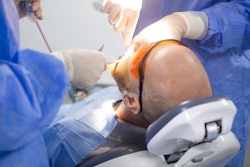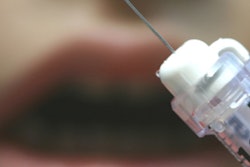
Telling patients what they can expect before a third-molar extraction procedure may help reduce their dental anxiety and postoperative pain, according to a study published on November 1 in the Journal of Oral and Maxillofacial Surgery.
Third-molar extractions can be an anxiety-provoking procedure for many patients. Of 67 dental procedures, tooth extraction is known to be the most frightening and one of the most frequently performed.
Prior to an extraction procedure, patients receive information about the procedure, its purpose, the anticipated benefits, common side effects, and possible serious complications that may occur. Depending on how information is delivered to patients, their anxiety levels and postoperative pain may be impacted.
"Anxiety is an emotional response that occurs as a result of the activation of autonomic nervous system by the anticipation of a future threat or stressful situation and third molar surgery among other procedures in oral surgery has been reported to induce high level of anxiety," wrote the study authors, led by Ayodele Gbenga Akomolafe of Obafemi Awolowo University Teaching Hospitals Complex in Ife, Nigeria, "thus the implementation of anxiety-reducing maneuvers pose an important role in the provision of the effective dental care to patients with anxiety."
Researchers recruited 90 patients between the ages of 18 and 35 years old who required third-molar extractions under local anesthesia. Patients were randomized into two groups based on the method of information they received about the extraction procedure: verbal or audiovisual. Patients in the verbal group were given detailed information about the surgical procedures, while those in the audiovisual group watched a real-life video of the procedure.
Before the procedure, the anxiety levels of patients in the verbal group decreased after information was provided. However, in the audiovisual group, researchers observed an increase in anxiety levels. The difference in average anxiety levels between the two groups was statistically significant.
"Therefore, it can be inferred that the information provided to the patients in the verbal group had a relieving effect on their anxiety level after a verbal explanation of both procedural and post-operative information," the study authors wrote.
Postoperative pain was similar in both groups on postoperative day one, but patients in the verbal group reported lower postoperative pain on days three and seven following the procedure.
"This decrease in pain has been attributed to improved adjustment and coping, and reduced state of anxiety," wrote the study's authors.
The findings suggest that it is possible to alter a patient's appraisal of an anxiety-inducing situation with an improved understanding of preoperative information using verbal delivery. This technique may lessen anxiety in patients who must undergo third-molar surgery.
"The present study demonstrated that providing information about the operative procedure and postsurgical recovery may improve the patients' knowledge of the surgical procedure and might have reduced their uncertainty about the procedure," Akomolafe and colleagues concluded.



















